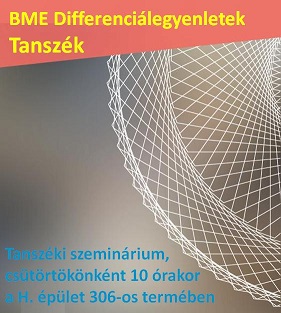2018. November 27.

MEGHÍVÓ
We kindly invite you to the Miklós Farkas Seminar.
29 November (Thursday) 10.15, BME H607 !
Gábor Stépán (BME, Department of Applied Mechanics)
Dynamics of hardware-in-the-loop experiments
A widely used tool of engineering R&D is the hardware-in-the-loop (HIL) experiment. Instead of building the full prototype of a developed machine, only its most critical parts are constructed physically, while the rest of the machine is emulated by means of actuators, sensors, and digital control in between. If the mathematical model of the rest of the machine is available, the control unit can provide a realistic environment for the physically constructed test part. The control, however, introduces digital effects into this system which is originally continuous. From dynamical view-point, the most relevant digital effects are the appearances of delay and zero-order-hold (ZOH). The nonlinear dynamics of the real system and the one emulated by means of the HIL experiment are compared from stability and nonlinear vibrations view-point in case of a brake system where stick-slip phenomenon occurs. The limitations of HIL experiments are identified by means of Hopf bifurcation calculations, numerical simulations and dynamic measurements carried out on the corresponding experimental test rig.
The introductory part of the lecture will present the concept of the ERC advanced grant project and the role of HIL in the development of new milling tools for metal cutting, and the concluding part of the lecture will present the application of the results for the development of HIL experiments in case of high-speed-milling (HSM).
The organizers
(István Faragó, János Karátson, Róbert Horváth, Miklós Mincsovics)
Visit the homepage of the seminar: http://math.bme.hu/AlkAnalSzemi
